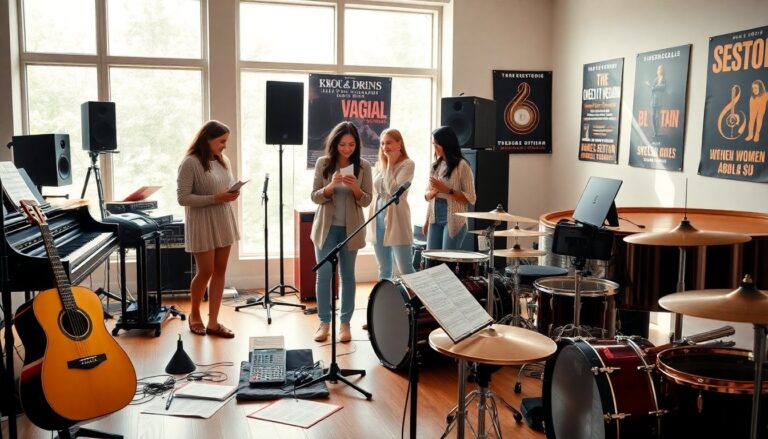Argomenti trattati
Gender equality in the music industry
The music industry has long served as a platform for artistic expression, but it remains a battleground for gender equality. Despite significant progress in recent years, women continue to encounter persistent challenges. The advocacy of influential artists such as Ariana Grande, Karol G, and Alicia Keys plays a crucial role in reshaping the industry. Their efforts contribute to creating a more inclusive environment where female voices can thrive.
The struggle for equality in music
The contributions of women in music have long been overshadowed by systemic sexism and double standards. As International Women’s Day approaches, the urgency for action toward gender equality in the music industry is more pronounced than ever. Movements like Me Too and Time’s Up have empowered women to share their experiences, demanding change and accountability within the industry.
Despite these efforts, significant disparities persist. Female artists often face a stark contrast in treatment compared to their male counterparts. While male musicians frequently enjoy greater freedom and respect, women are subjected to undue scrutiny and criticism. This ongoing struggle highlights the need for continued advocacy and reform to achieve true equality in music.
Trailblazers advocating for change
Taylor Swift exemplifies resilience in the face of adversity, particularly regarding sexism in the music industry. As the first woman to win the GRAMMY for Album of the Year three times, Swift has demonstrated her exceptional talent while also leveraging her platform to confront gender biases. She has openly discussed the criticisms she encounters for expressing her emotions through her songwriting, a privilege that is frequently afforded to male artists without scrutiny.
In her hit song “The Man,” Swift examines the disparate standards that women face compared to their male counterparts in the industry. Her documentary, Miss Americana, delves deeper into these issues, emphasizing the necessity for women to continually reinvent themselves in order to gain recognition and respect.
Brandi Carlile’s commitment to support
Brandi Carlile exemplifies the spirit of activism throughout her music career. She asserts that politics are inescapable, stating, “I wake up every day political.” In collaboration with fellow artists, she co-founded the Highwomen, a collective dedicated to mentoring and uplifting emerging female musicians. Additionally, her organization, the Looking Out Foundation, amplifies the voices of underrepresented communities, highlighting her commitment to social causes.
Recently, Carlile took to social media to challenge country radio stations to ensure equitable airplay for both male and female artists. This action reflects her unwavering dedication to dismantling the barriers that women encounter in the music industry.
Iconic figures reshaping perceptions
Madonna has been a trailblazer in the music industry since the 1980s. She has redefined the concept of a powerful woman in music and has persistently challenged ageism that impacts female artists. Madonna’s determination to reject societal norms regarding aging has motivated countless women to celebrate their individuality at every stage of life.
Alicia Keys has also emerged as a strong advocate for women in music. In 2018, she co-founded She Is The Music, an initiative designed to foster a unified platform for women in the industry. This organization seeks to enhance female representation in music and to empower future generations of women to pursue careers in this field.
Inspiring voices of the next generation
Janet Jackson has consistently leveraged her influence to advocate for women, addressing issues of sexism and racism. Her song “Control” serves as an anthem of empowerment, urging women to take charge of their lives. During award shows, Jackson often emphasizes the importance of utilizing one’s platform to uplift those who feel marginalized.
Pink has similarly made an impact by challenging societal beauty standards and promoting authenticity. Her lyrics resonate with many, as she celebrates individuality and supports those who defy conventional expectations. In her acceptance speeches, she frequently highlights the significance of self-acceptance and the importance of remaining true to oneself.
Empowerment through solidarity
Ariana Grande has been a vocal advocate for female artists, drawing attention to the disparities in treatment based on gender. She emphasizes the necessity of solidarity among women in the music industry, asserting the importance of supporting one another in the face of misogyny and discrimination. Grande’s message centers on the concept of sisterhood, urging women to elevate each other rather than engage in competition.
The challenges faced by women in music are further exacerbated by ageism, a subject that Lady Gaga has been addressing since the beginning of her career. She seeks to inspire women to embrace their age and persist in pursuing their dreams, undeterred by societal expectations. Gaga’s advocacy for Britney Spears illustrates her dedication to confronting the injustices that women encounter within the industry.
Karol G’s rise and influence
Karol G stands out as a prominent figure in Latin music, having made notable advancements in advocating for women within the industry. Acknowledging the existing disparities in representation, she has called for a united movement, emphasizing that there is room for all women in music. Her accomplishments, including a GRAMMY award, reflect her commitment to reshaping the musical landscape for future artists.
In her acceptance speeches, Karol G frequently highlights the significance of perseverance and self-worth. She inspires others to overcome challenges and pursue their passions without hesitation. Her message resonates with many, empowering women to recognize and embrace their strength and potential.
As the music industry continues to evolve, the influence of artists like Karol G serves as a source of inspiration for women seeking equality and recognition. Their combined efforts are instrumental in fostering a brighter and more inclusive future in the music world.

